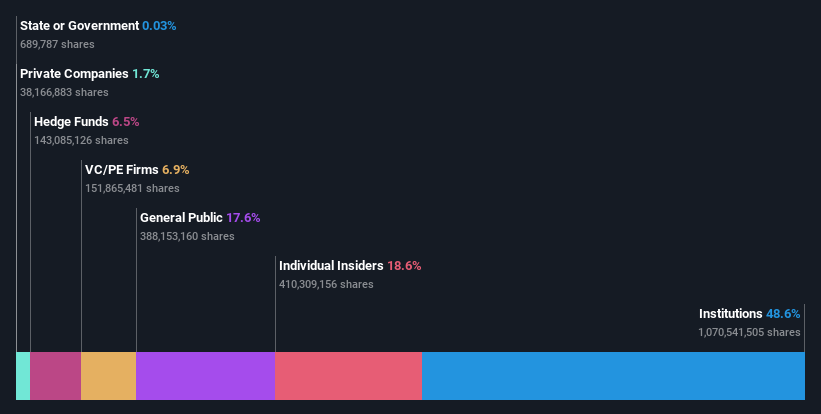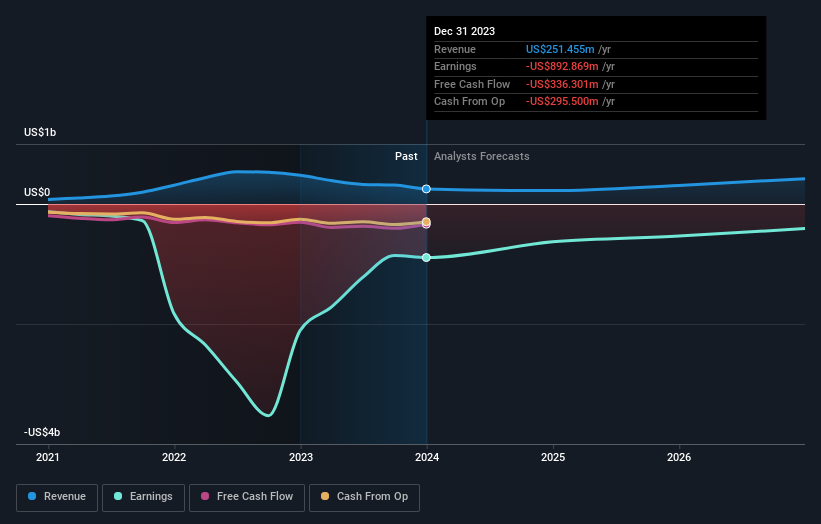Recent uptick might appease Ginkgo Bioworks Holdings, Inc. (NYSE:DNA) institutional owners after losing 25% over the past year
Key Insights
Significantly high institutional ownership implies Ginkgo Bioworks Holdings' stock price is sensitive to their trading actions
51% of the business is held by the top 8 shareholders
If you want to know who really controls Ginkgo Bioworks Holdings, Inc. (NYSE:DNA), then you'll have to look at the makeup of its share registry. And the group that holds the biggest piece of the pie are institutions with 49% ownership. In other words, the group stands to gain the most (or lose the most) from their investment into the company.
Institutional investors would probably welcome last week's 11% increase in the share price after a year of 25% losses as a sign that returns may to begin trending higher.
Let's delve deeper into each type of owner of Ginkgo Bioworks Holdings, beginning with the chart below.
Check out our latest analysis for Ginkgo Bioworks Holdings
What Does The Institutional Ownership Tell Us About Ginkgo Bioworks Holdings?
Many institutions measure their performance against an index that approximates the local market. So they usually pay more attention to companies that are included in major indices.
Ginkgo Bioworks Holdings already has institutions on the share registry. Indeed, they own a respectable stake in the company. This can indicate that the company has a certain degree of credibility in the investment community. However, it is best to be wary of relying on the supposed validation that comes with institutional investors. They too, get it wrong sometimes. It is not uncommon to see a big share price drop if two large institutional investors try to sell out of a stock at the same time. So it is worth checking the past earnings trajectory of Ginkgo Bioworks Holdings, (below). Of course, keep in mind that there are other factors to consider, too.
It would appear that 6.5% of Ginkgo Bioworks Holdings shares are controlled by hedge funds. That worth noting, since hedge funds are often quite active investors, who may try to influence management. Many want to see value creation (and a higher share price) in the short term or medium term. Looking at our data, we can see that the largest shareholder is Baillie Gifford & Co. with 11% of shares outstanding. Meanwhile, the second and third largest shareholders, hold 8.6% and 6.9%, of the shares outstanding, respectively. In addition, we found that Jason Kelly, the CEO has 3.9% of the shares allocated to their name.
On further inspection, we found that more than half the company's shares are owned by the top 8 shareholders, suggesting that the interests of the larger shareholders are balanced out to an extent by the smaller ones.
While it makes sense to study institutional ownership data for a company, it also makes sense to study analyst sentiments to know which way the wind is blowing. Quite a few analysts cover the stock, so you could look into forecast growth quite easily.
Insider Ownership Of Ginkgo Bioworks Holdings
The definition of company insiders can be subjective and does vary between jurisdictions. Our data reflects individual insiders, capturing board members at the very least. The company management answer to the board and the latter should represent the interests of shareholders. Notably, sometimes top-level managers are on the board themselves.
Most consider insider ownership a positive because it can indicate the board is well aligned with other shareholders. However, on some occasions too much power is concentrated within this group.
It seems insiders own a significant proportion of Ginkgo Bioworks Holdings, Inc.. Insiders own US$392m worth of shares in the US$2.1b company. That's quite meaningful. It is good to see this level of investment. You can check here to see if those insiders have been buying recently.
General Public Ownership
With a 18% ownership, the general public, mostly comprising of individual investors, have some degree of sway over Ginkgo Bioworks Holdings. While this group can't necessarily call the shots, it can certainly have a real influence on how the company is run.
Private Equity Ownership
Private equity firms hold a 6.9% stake in Ginkgo Bioworks Holdings. This suggests they can be influential in key policy decisions. Some might like this, because private equity are sometimes activists who hold management accountable. But other times, private equity is selling out, having taking the company public.
Next Steps:
I find it very interesting to look at who exactly owns a company. But to truly gain insight, we need to consider other information, too. Take risks for example - Ginkgo Bioworks Holdings has 3 warning signs we think you should be aware of.
Ultimately the future is most important. You can access this free report on analyst forecasts for the company.
NB: Figures in this article are calculated using data from the last twelve months, which refer to the 12-month period ending on the last date of the month the financial statement is dated. This may not be consistent with full year annual report figures.
Have feedback on this article? Concerned about the content? Get in touch with us directly. Alternatively, email editorial-team (at) simplywallst.com.
This article by Simply Wall St is general in nature. We provide commentary based on historical data and analyst forecasts only using an unbiased methodology and our articles are not intended to be financial advice. It does not constitute a recommendation to buy or sell any stock, and does not take account of your objectives, or your financial situation. We aim to bring you long-term focused analysis driven by fundamental data. Note that our analysis may not factor in the latest price-sensitive company announcements or qualitative material. Simply Wall St has no position in any stocks mentioned.

 Yahoo Finance
Yahoo Finance 

